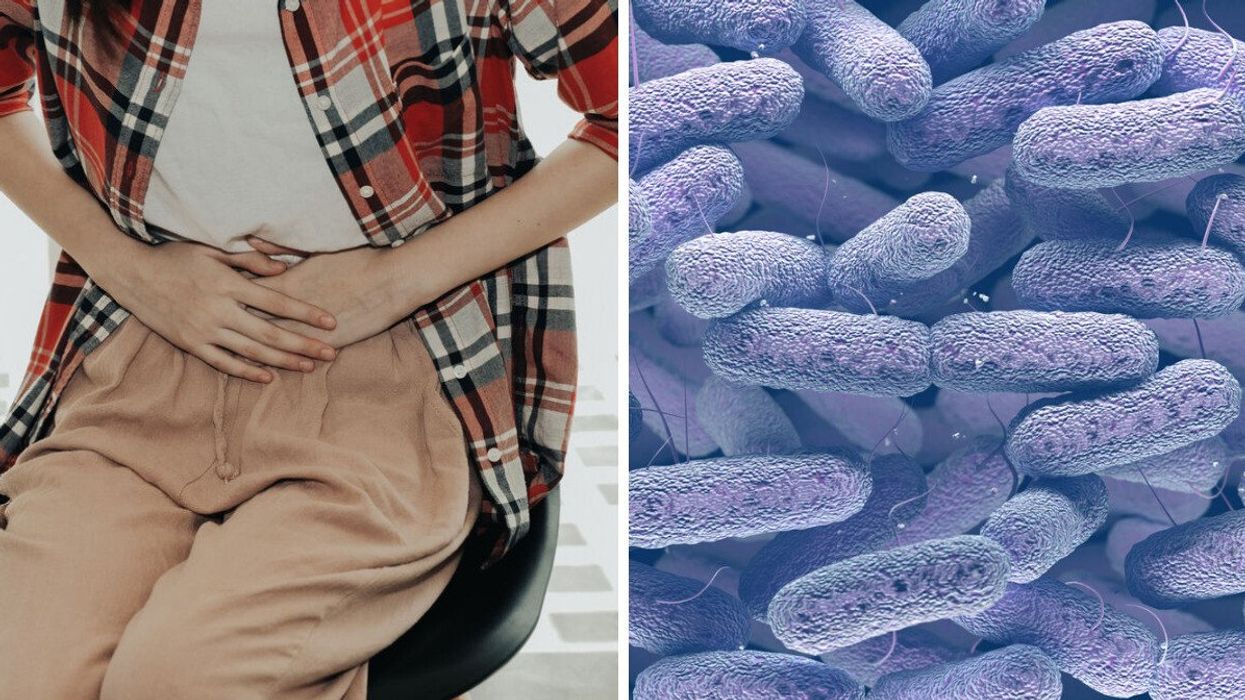The CDC Is Warning About A Stomach Bug That Meds Won't Kill & Here's How To Avoid Getting Sick
First-choice antibiotics for this infection may not work.

A woman holding her stomach. Right: Enterobacteriaceae bacteria family.
The Centers for Disease Control and Prevention (CDC) is warning about an increase in a bug that attacks your stomach and is resistant to all of the commonly recommended antibiotics in the United States.
Shigellosis is an infection caused by the Shigella bacteria, which attacks the stomach and includes symptoms like diarrhea, fever, stomach pain, and feeling the need to poop even when the bowels are empty, the CDC states.
When do shigellosis symptoms start, and how long does the infection last?
The symptoms of this illness usually appear one or two days after being infected and last around seven days.
Who is more likely to get shigellosis?
The CDC says that children under five, travelers, men who have sex with men, and people with weakened immune systems are more prone to get an infection caused by one of the four different species of shigella — Shigella sonnei, Shigella flexneri, Shigella boydii, and Shigella dysenteriae.
What is antimicrobial resistance?
Antimicrobial resistance happens when germs no longer react or are killed by the drugs designed to cure the patient, meaning that the bacteria or fungi continue to grow.
"If Shigella bacteria are resistant, first-choice antibiotics recommended to treat these infections may not work," the CDC states. "Healthcare providers might need to prescribe second- or third-choice drugs for treatment. However, these drugs might be less effective, may need to be taken through a vein (IV) instead of by mouth, may be more toxic, and may be more expensive."
According to the CDC, the recommended antibiotics for severe infections are fluoroquinolones, azithromycin, and ceftriaxone.
How can I prevent getting a shigellosis infection?
These are the steps suggested by the CDC to reduce the chances of getting shigellosis:
- Wash your hands with soap and water before preparing food and eating and after changing a diaper or helping to clean another person’s poop.
- If you are taking care of a child in diapers who has been infected with shigellosis, you are urged to throw the diapers away in a covered, lined trash can. Wash your and the child’s hands after changing the diaper and clean up any leaks or spills.
- Avoid drinking water from lakes, ponds, or untreated pools.
- When you’re traveling internationally, adopt safe eating and drinking habits and wash your hands often.
- If your partner has diarrhea, avoid having sex for one week after recovery. For Shigella in particular, the CDC advises waiting several weeks after recovery, as the bacteria may still be in stool for that long after symptoms have subsided.
For more information on shigellosis, you can visit the CDC's official website.
This article's cover image was used for illustrative purposes only.